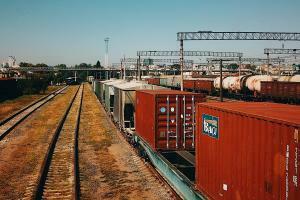Working with the Government and other partners in Ukraine (ICC Ukraine, PPL 33-35), 42 other countries, and key regional and sectoral organizations, UNECE delivered this message at the UNECE Annual Seminar in Odessa on Trade and Transport Facilitation which was held online from 26 to 28 May 2021. This year's event focused on the harmonization and integration of information flows in transport corridors in accordance with the Multimodal Transport Reference Data Model (MMT RDM) of the UN / CEFACT, a subsidiary body of the UNECE.
The effect of efficiency is demonstrated in the following example concerning the digitization of the eCMR waybill: the cost of issuing and using one CMR paper waybill is 6.23 euros, which on average takes 20.15 minutes of staff time, while for issuing and using an electronic eCMR requires € 1.69 and 5.5 minutes.
Work is done within the framework of the UN Development Account cross-sectoral project. With regard to the immediate response to the challenges of the pandemic, experts have developed a set of standards for the digitization of key documents accompanying goods transported by various modes of transport. The last replenishment of the package was the artifacts of the SMGS consignment note, issued a week before the seminar. If implemented, these standards will ensure interoperability across multimodal transport and supply chains. Standards have been prepared for documents accompanying goods by road, rail, sea and inland waterways. Work began on the last remaining mode of transport: air. UN / CEFACT and FIATA experts developed and presented at the seminar a digital version of the FIATA multimodal bill of lading, consistent with UN / CEFACT standards. The positive effects and future prospects of these products were presented at the workshop, showing the direction for many other stakeholders.
Mr. Taras Kachka, Deputy Minister of Economy and Trade Representative of Ukraine, who opened the UNECE annual seminar for the third time, stressed its importance for developing innovative solutions in trade and transport. The pandemic has opened two windows of opportunity for better recovery than it was before the crisis. UNECE and its partners in Ukraine have been able to bring together stakeholders from a much larger number of countries and organizations than in previous years.
Now more than ever, governments, international organizations and business leaders are realizing the value of harmonizing the information flows that accompany the cross-border movement of goods. The seminar discussed two transport corridors - the Black Sea-Baltic Sea and the Moldova-Ukraine-Georgia-Azerbaijan corridors. Three UN organizations that ensure the standardization of transport and trade documents - UNECE, IMO and ICAO - and at least twelve other sectoral, regional or business organizations were actively involved: BSEC, TRACECA, European Commission (DG TAXUD and DG MOVE); OSJD, CIT, IRU, FIATA, CLECAT, IPCSA, IATA, GUAM and WEF.
As the head of the digital freight transport division of the International Air Transport Association (IATA) noted, the electronic information exchange standards that we now use in 2000 were developed 20 or more years ago, so now we are developing standards for 2030. -2040. It will take time and money to implement them, but the benefits are clear.
Source: Advancing next generation standards to digitalize data and document exchange in multimodal transport and trade, leveraging UN/CEFACT norms | UNECE


